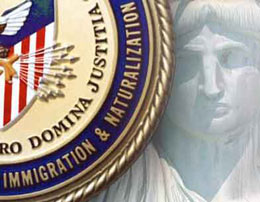 |
 |
 |
 News from Around the Americas | February 2005 News from Around the Americas | February 2005  
Bush Immigration Plan A Tough Sell
 Associated Press Associated Press

An estimated 10 million immigrants live in the United States illegally; the vast majority are from Mexico, with an additional million arriving every year.
 
A hint of the trouble ahead for Bush on immigration came this month when proposals to tighten — not ease — border restrictions nearly undermined a bill to restructure U.S. intelligence agencies.

The chairman of the House Judiciary Committee wanted the measure to bar states from giving a driver's license to illegal immigrants. Rep. James Sensenbrenner, R-Wis., said some of the Sept. 11 hijackers gained access to U.S. aircraft by using a driver's license as identification.

Sensenbrenner ultimately backed down, but only after House Speaker Dennis Hastert, R-Ill, promised that the chairman's proposal would be considered in separate legislation in 2005.

Hastert also indicated he would not move ahead on major legislation unless it was supported by a majority of Republicans in the GOP-controlled House — and that he would not rely on Democratic support to pass a bill.

Immigration overhaul is "an issue that splits both parties, and given the new Hastert rule, may never go anywhere," said William A. Niskanen, chairman of the libertarian Cato Institute. Niskanen was a member of President Reagan's Council of Economic Advisers.

The president's plan would grant temporary-worker status, for three years to six years, to millions of undocumented workers. It also would it easier for those workers to get permanent U.S. citizenship.

As governor of Texas, Bush was committed to immigration changes. As president, he came close to making a deal with Mexican President Vicente Fox in the days before the attacks of Sept. 11, 2001. Those plans were put on hold as tighter borders took on a higher priority for the United States.

As a presidential candidate, both in 2000 and 2004, Bush eagerly courted Hispanics, the fastest-growing ethnic group in the electorate.

"We will keep working to make this nation a welcoming place for Hispanic people, a land of opportunity para todos (for all) who live here in America," Bush told the League of United Latin American Citizens last summer.

Bush claimed 35 percent of Hispanic voters in 2000 and at least 40 percent last Nov. 2, according to exit polls. That compares with the 21 percent won by Bob Dole in 1996 and the 25 percent that Bush's father got in 1992.

Republican consultants suggest Bush will not make a big push for his immigration bill until he has achieved his goals on Social Security and the tax laws. They also say the president may jettison the immigration bill if it would jeopardize other parts of his agenda.

Inside the administration, nobody is suggesting that passing the immigration plan would be anything other than extremely difficult.

"We don't want to overpromise," Secretary of State Colin Powell said during a visit last month to Mexico City.

| 
 | |
 |



